Management and Operations Report: Roles, Theories, and Approaches
VerifiedAdded on 2021/02/21
|14
|3973
|152
Report
AI Summary
This report delves into the crucial elements of leadership and management within an organization, specifically focusing on the roles and characteristics of leaders and managers, highlighting qualities such as positive attitude, communication, and empathy. It explores how leaders and managers function in various situations, including stable environments, development phases, product deficiencies, and rapidly changing scenarios. The report examines theoretical frameworks like situational leadership, systems leadership, and contingency theory, illustrating their impact on decision-making and organizational growth. Furthermore, it outlines key approaches to operations management, such as lean manufacturing, Just-in-Time (JIT), and Total Quality Management (TQM), emphasizing their significance in enhancing productivity and minimizing waste within the organization. This report provides a comprehensive overview of leadership, management, and operational strategies, offering valuable insights into effective organizational practices.
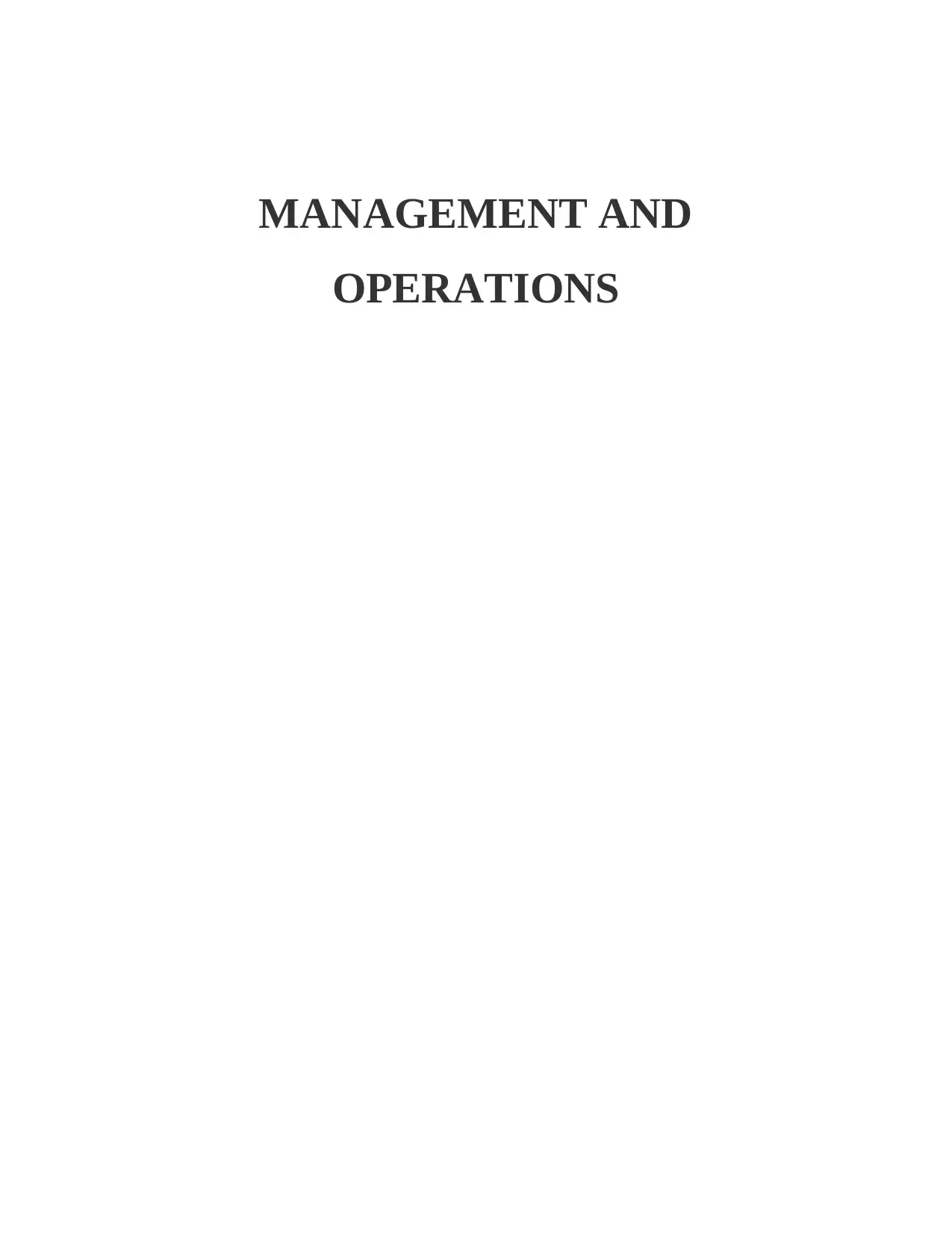
MANAGEMENT AND
OPERATIONS
OPERATIONS
Paraphrase This Document
Need a fresh take? Get an instant paraphrase of this document with our AI Paraphraser
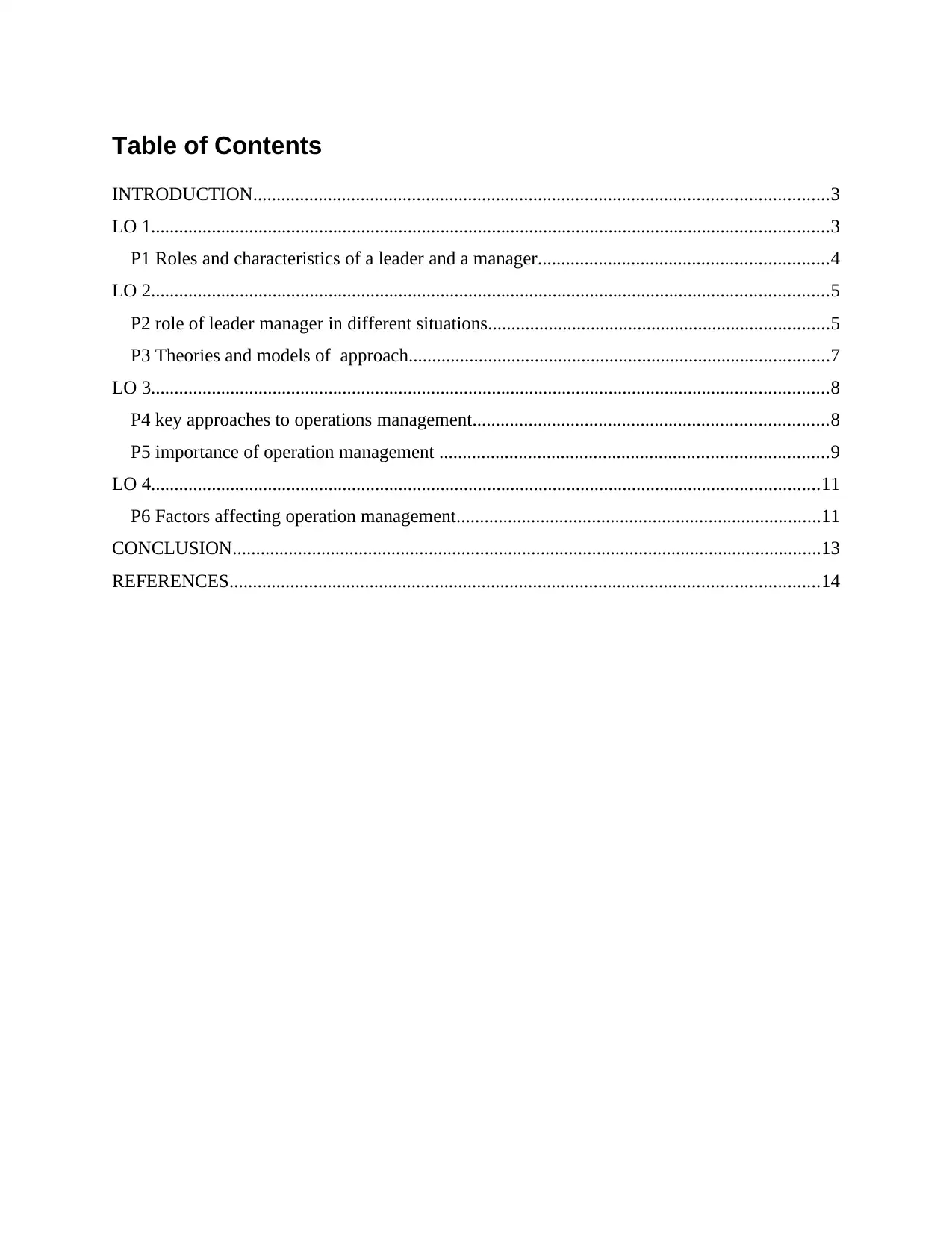
Table of Contents
INTRODUCTION...........................................................................................................................3
LO 1.................................................................................................................................................3
P1 Roles and characteristics of a leader and a manager..............................................................4
LO 2.................................................................................................................................................5
P2 role of leader manager in different situations.........................................................................5
P3 Theories and models of approach..........................................................................................7
LO 3.................................................................................................................................................8
P4 key approaches to operations management............................................................................8
P5 importance of operation management ...................................................................................9
LO 4...............................................................................................................................................11
P6 Factors affecting operation management..............................................................................11
CONCLUSION..............................................................................................................................13
REFERENCES..............................................................................................................................14
INTRODUCTION...........................................................................................................................3
LO 1.................................................................................................................................................3
P1 Roles and characteristics of a leader and a manager..............................................................4
LO 2.................................................................................................................................................5
P2 role of leader manager in different situations.........................................................................5
P3 Theories and models of approach..........................................................................................7
LO 3.................................................................................................................................................8
P4 key approaches to operations management............................................................................8
P5 importance of operation management ...................................................................................9
LO 4...............................................................................................................................................11
P6 Factors affecting operation management..............................................................................11
CONCLUSION..............................................................................................................................13
REFERENCES..............................................................................................................................14
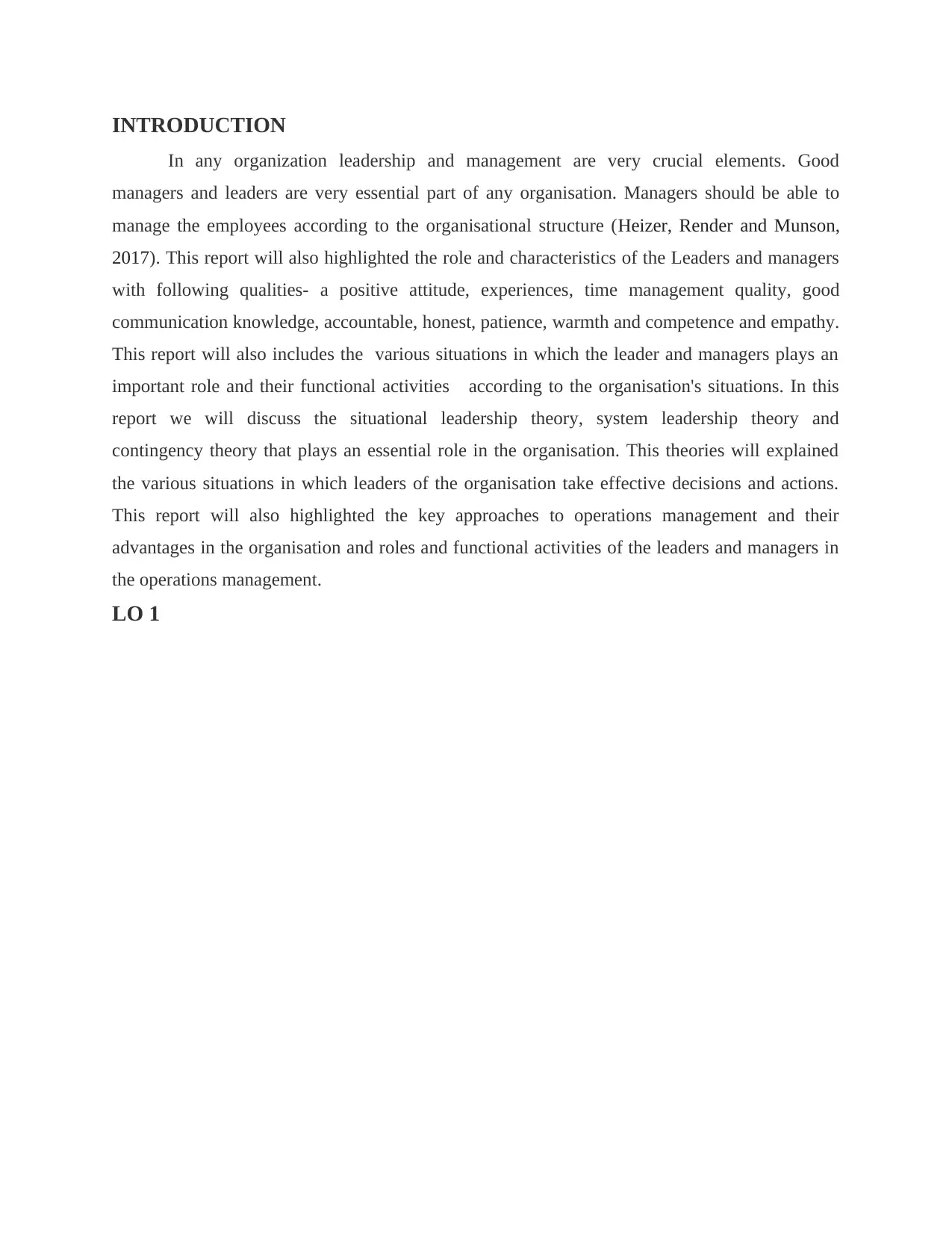
INTRODUCTION
In any organization leadership and management are very crucial elements. Good
managers and leaders are very essential part of any organisation. Managers should be able to
manage the employees according to the organisational structure (Heizer, Render and Munson,
2017). This report will also highlighted the role and characteristics of the Leaders and managers
with following qualities- a positive attitude, experiences, time management quality, good
communication knowledge, accountable, honest, patience, warmth and competence and empathy.
This report will also includes the various situations in which the leader and managers plays an
important role and their functional activities according to the organisation's situations. In this
report we will discuss the situational leadership theory, system leadership theory and
contingency theory that plays an essential role in the organisation. This theories will explained
the various situations in which leaders of the organisation take effective decisions and actions.
This report will also highlighted the key approaches to operations management and their
advantages in the organisation and roles and functional activities of the leaders and managers in
the operations management.
LO 1
In any organization leadership and management are very crucial elements. Good
managers and leaders are very essential part of any organisation. Managers should be able to
manage the employees according to the organisational structure (Heizer, Render and Munson,
2017). This report will also highlighted the role and characteristics of the Leaders and managers
with following qualities- a positive attitude, experiences, time management quality, good
communication knowledge, accountable, honest, patience, warmth and competence and empathy.
This report will also includes the various situations in which the leader and managers plays an
important role and their functional activities according to the organisation's situations. In this
report we will discuss the situational leadership theory, system leadership theory and
contingency theory that plays an essential role in the organisation. This theories will explained
the various situations in which leaders of the organisation take effective decisions and actions.
This report will also highlighted the key approaches to operations management and their
advantages in the organisation and roles and functional activities of the leaders and managers in
the operations management.
LO 1
⊘ This is a preview!⊘
Do you want full access?
Subscribe today to unlock all pages.

Trusted by 1+ million students worldwide
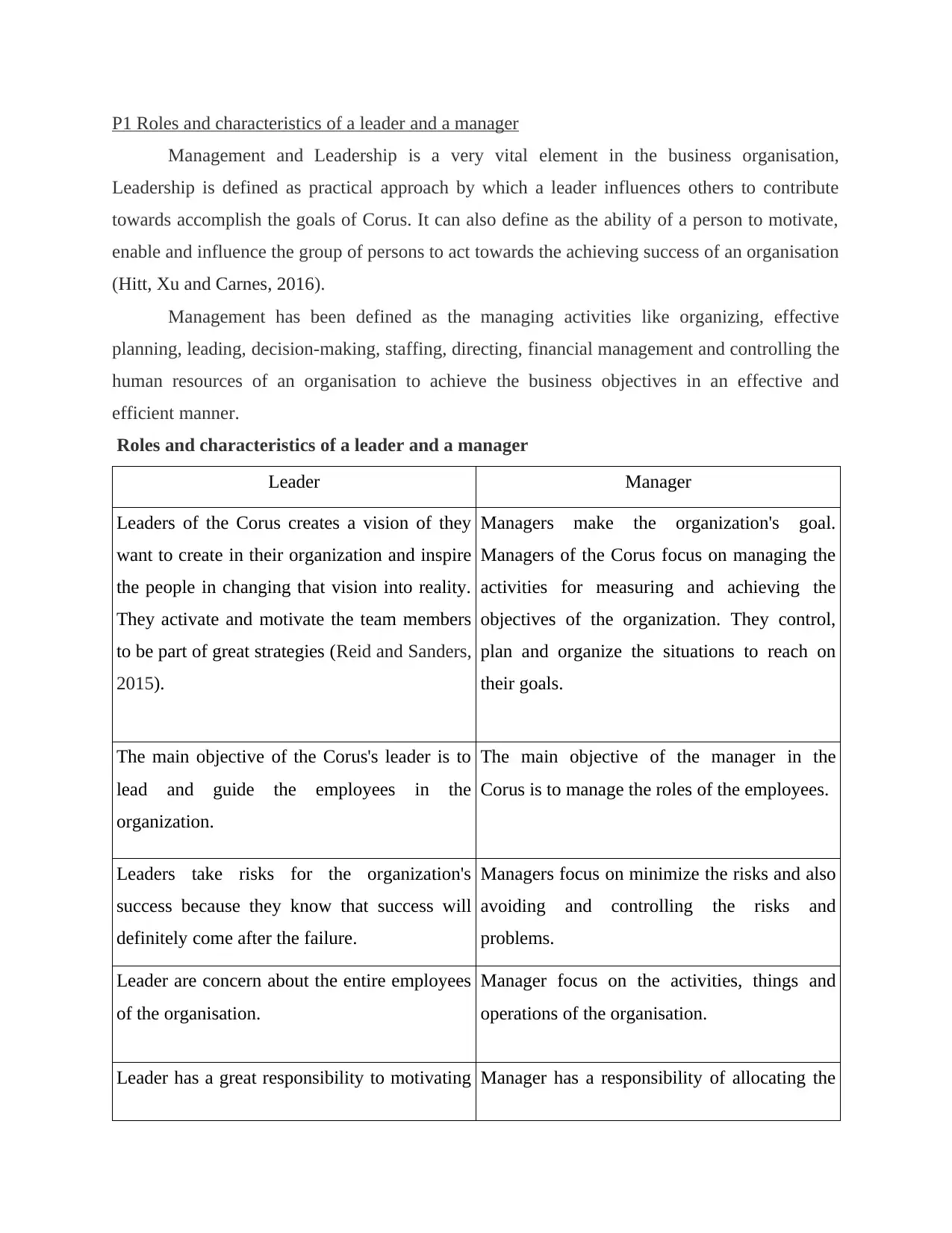
P1 Roles and characteristics of a leader and a manager
Management and Leadership is a very vital element in the business organisation,
Leadership is defined as practical approach by which a leader influences others to contribute
towards accomplish the goals of Corus. It can also define as the ability of a person to motivate,
enable and influence the group of persons to act towards the achieving success of an organisation
(Hitt, Xu and Carnes, 2016).
Management has been defined as the managing activities like organizing, effective
planning, leading, decision-making, staffing, directing, financial management and controlling the
human resources of an organisation to achieve the business objectives in an effective and
efficient manner.
Roles and characteristics of a leader and a manager
Leader Manager
Leaders of the Corus creates a vision of they
want to create in their organization and inspire
the people in changing that vision into reality.
They activate and motivate the team members
to be part of great strategies (Reid and Sanders,
2015).
Managers make the organization's goal.
Managers of the Corus focus on managing the
activities for measuring and achieving the
objectives of the organization. They control,
plan and organize the situations to reach on
their goals.
The main objective of the Corus's leader is to
lead and guide the employees in the
organization.
The main objective of the manager in the
Corus is to manage the roles of the employees.
Leaders take risks for the organization's
success because they know that success will
definitely come after the failure.
Managers focus on minimize the risks and also
avoiding and controlling the risks and
problems.
Leader are concern about the entire employees
of the organisation.
Manager focus on the activities, things and
operations of the organisation.
Leader has a great responsibility to motivating Manager has a responsibility of allocating the
Management and Leadership is a very vital element in the business organisation,
Leadership is defined as practical approach by which a leader influences others to contribute
towards accomplish the goals of Corus. It can also define as the ability of a person to motivate,
enable and influence the group of persons to act towards the achieving success of an organisation
(Hitt, Xu and Carnes, 2016).
Management has been defined as the managing activities like organizing, effective
planning, leading, decision-making, staffing, directing, financial management and controlling the
human resources of an organisation to achieve the business objectives in an effective and
efficient manner.
Roles and characteristics of a leader and a manager
Leader Manager
Leaders of the Corus creates a vision of they
want to create in their organization and inspire
the people in changing that vision into reality.
They activate and motivate the team members
to be part of great strategies (Reid and Sanders,
2015).
Managers make the organization's goal.
Managers of the Corus focus on managing the
activities for measuring and achieving the
objectives of the organization. They control,
plan and organize the situations to reach on
their goals.
The main objective of the Corus's leader is to
lead and guide the employees in the
organization.
The main objective of the manager in the
Corus is to manage the roles of the employees.
Leaders take risks for the organization's
success because they know that success will
definitely come after the failure.
Managers focus on minimize the risks and also
avoiding and controlling the risks and
problems.
Leader are concern about the entire employees
of the organisation.
Manager focus on the activities, things and
operations of the organisation.
Leader has a great responsibility to motivating Manager has a responsibility of allocating the
Paraphrase This Document
Need a fresh take? Get an instant paraphrase of this document with our AI Paraphraser
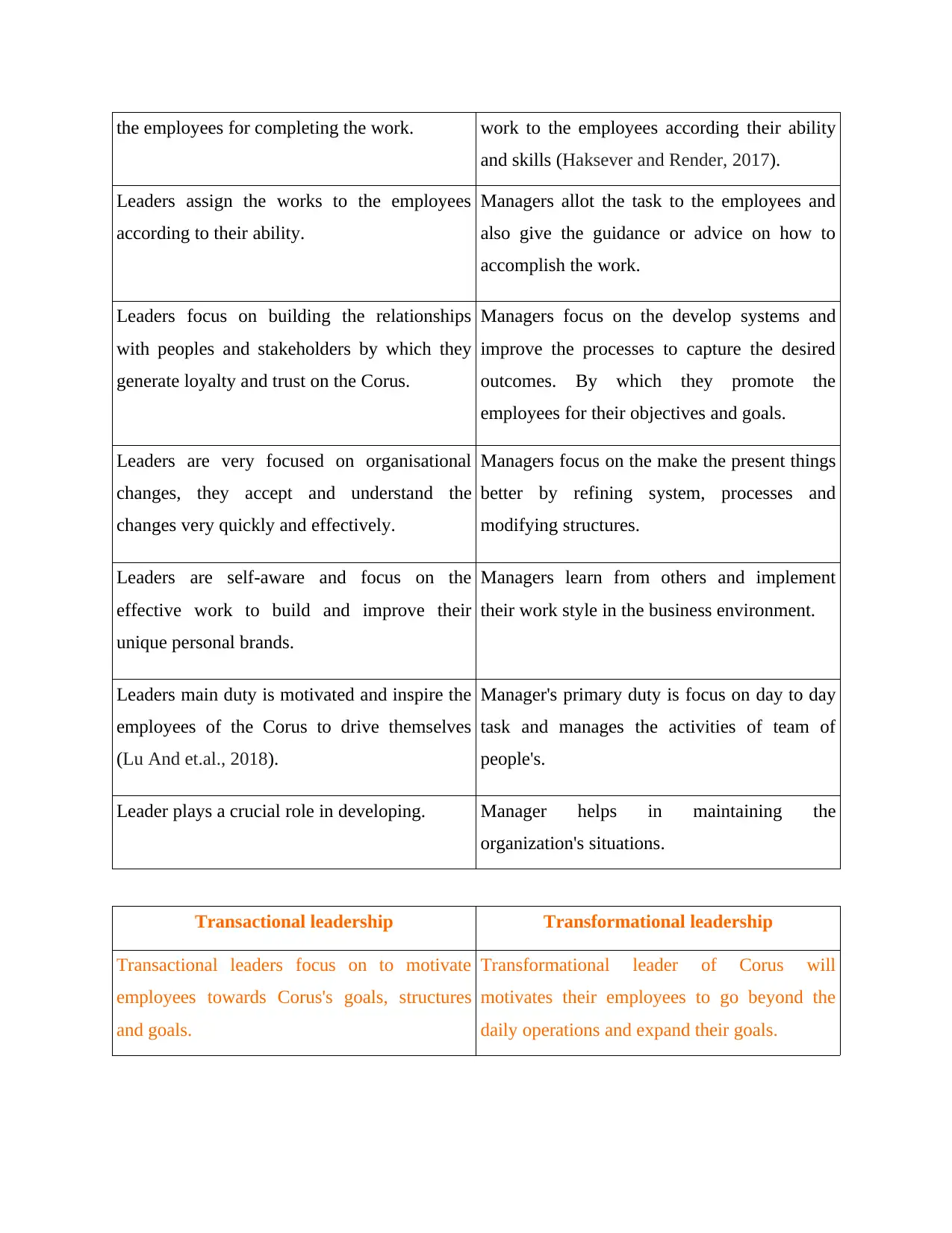
the employees for completing the work. work to the employees according their ability
and skills (Haksever and Render, 2017).
Leaders assign the works to the employees
according to their ability.
Managers allot the task to the employees and
also give the guidance or advice on how to
accomplish the work.
Leaders focus on building the relationships
with peoples and stakeholders by which they
generate loyalty and trust on the Corus.
Managers focus on the develop systems and
improve the processes to capture the desired
outcomes. By which they promote the
employees for their objectives and goals.
Leaders are very focused on organisational
changes, they accept and understand the
changes very quickly and effectively.
Managers focus on the make the present things
better by refining system, processes and
modifying structures.
Leaders are self-aware and focus on the
effective work to build and improve their
unique personal brands.
Managers learn from others and implement
their work style in the business environment.
Leaders main duty is motivated and inspire the
employees of the Corus to drive themselves
(Lu And et.al., 2018).
Manager's primary duty is focus on day to day
task and manages the activities of team of
people's.
Leader plays a crucial role in developing. Manager helps in maintaining the
organization's situations.
Transactional leadership Transformational leadership
Transactional leaders focus on to motivate
employees towards Corus's goals, structures
and goals.
Transformational leader of Corus will
motivates their employees to go beyond the
daily operations and expand their goals.
and skills (Haksever and Render, 2017).
Leaders assign the works to the employees
according to their ability.
Managers allot the task to the employees and
also give the guidance or advice on how to
accomplish the work.
Leaders focus on building the relationships
with peoples and stakeholders by which they
generate loyalty and trust on the Corus.
Managers focus on the develop systems and
improve the processes to capture the desired
outcomes. By which they promote the
employees for their objectives and goals.
Leaders are very focused on organisational
changes, they accept and understand the
changes very quickly and effectively.
Managers focus on the make the present things
better by refining system, processes and
modifying structures.
Leaders are self-aware and focus on the
effective work to build and improve their
unique personal brands.
Managers learn from others and implement
their work style in the business environment.
Leaders main duty is motivated and inspire the
employees of the Corus to drive themselves
(Lu And et.al., 2018).
Manager's primary duty is focus on day to day
task and manages the activities of team of
people's.
Leader plays a crucial role in developing. Manager helps in maintaining the
organization's situations.
Transactional leadership Transformational leadership
Transactional leaders focus on to motivate
employees towards Corus's goals, structures
and goals.
Transformational leader of Corus will
motivates their employees to go beyond the
daily operations and expand their goals.
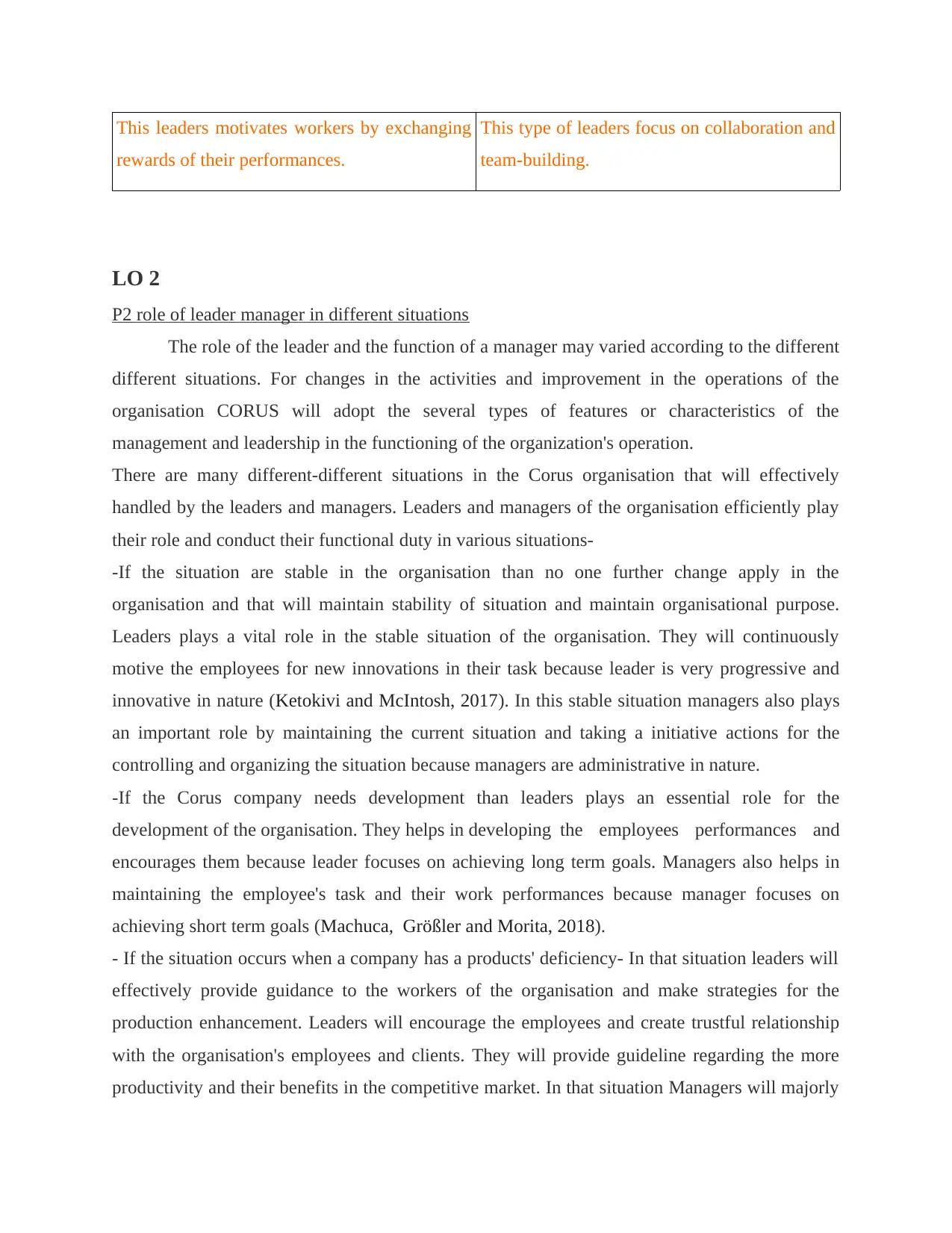
This leaders motivates workers by exchanging
rewards of their performances.
This type of leaders focus on collaboration and
team-building.
LO 2
P2 role of leader manager in different situations
The role of the leader and the function of a manager may varied according to the different
different situations. For changes in the activities and improvement in the operations of the
organisation CORUS will adopt the several types of features or characteristics of the
management and leadership in the functioning of the organization's operation.
There are many different-different situations in the Corus organisation that will effectively
handled by the leaders and managers. Leaders and managers of the organisation efficiently play
their role and conduct their functional duty in various situations-
-If the situation are stable in the organisation than no one further change apply in the
organisation and that will maintain stability of situation and maintain organisational purpose.
Leaders plays a vital role in the stable situation of the organisation. They will continuously
motive the employees for new innovations in their task because leader is very progressive and
innovative in nature (Ketokivi and McIntosh, 2017). In this stable situation managers also plays
an important role by maintaining the current situation and taking a initiative actions for the
controlling and organizing the situation because managers are administrative in nature.
-If the Corus company needs development than leaders plays an essential role for the
development of the organisation. They helps in developing the employees performances and
encourages them because leader focuses on achieving long term goals. Managers also helps in
maintaining the employee's task and their work performances because manager focuses on
achieving short term goals (Machuca, Größler and Morita, 2018).
- If the situation occurs when a company has a products' deficiency- In that situation leaders will
effectively provide guidance to the workers of the organisation and make strategies for the
production enhancement. Leaders will encourage the employees and create trustful relationship
with the organisation's employees and clients. They will provide guideline regarding the more
productivity and their benefits in the competitive market. In that situation Managers will majorly
rewards of their performances.
This type of leaders focus on collaboration and
team-building.
LO 2
P2 role of leader manager in different situations
The role of the leader and the function of a manager may varied according to the different
different situations. For changes in the activities and improvement in the operations of the
organisation CORUS will adopt the several types of features or characteristics of the
management and leadership in the functioning of the organization's operation.
There are many different-different situations in the Corus organisation that will effectively
handled by the leaders and managers. Leaders and managers of the organisation efficiently play
their role and conduct their functional duty in various situations-
-If the situation are stable in the organisation than no one further change apply in the
organisation and that will maintain stability of situation and maintain organisational purpose.
Leaders plays a vital role in the stable situation of the organisation. They will continuously
motive the employees for new innovations in their task because leader is very progressive and
innovative in nature (Ketokivi and McIntosh, 2017). In this stable situation managers also plays
an important role by maintaining the current situation and taking a initiative actions for the
controlling and organizing the situation because managers are administrative in nature.
-If the Corus company needs development than leaders plays an essential role for the
development of the organisation. They helps in developing the employees performances and
encourages them because leader focuses on achieving long term goals. Managers also helps in
maintaining the employee's task and their work performances because manager focuses on
achieving short term goals (Machuca, Größler and Morita, 2018).
- If the situation occurs when a company has a products' deficiency- In that situation leaders will
effectively provide guidance to the workers of the organisation and make strategies for the
production enhancement. Leaders will encourage the employees and create trustful relationship
with the organisation's employees and clients. They will provide guideline regarding the more
productivity and their benefits in the competitive market. In that situation Managers will majorly
⊘ This is a preview!⊘
Do you want full access?
Subscribe today to unlock all pages.

Trusted by 1+ million students worldwide
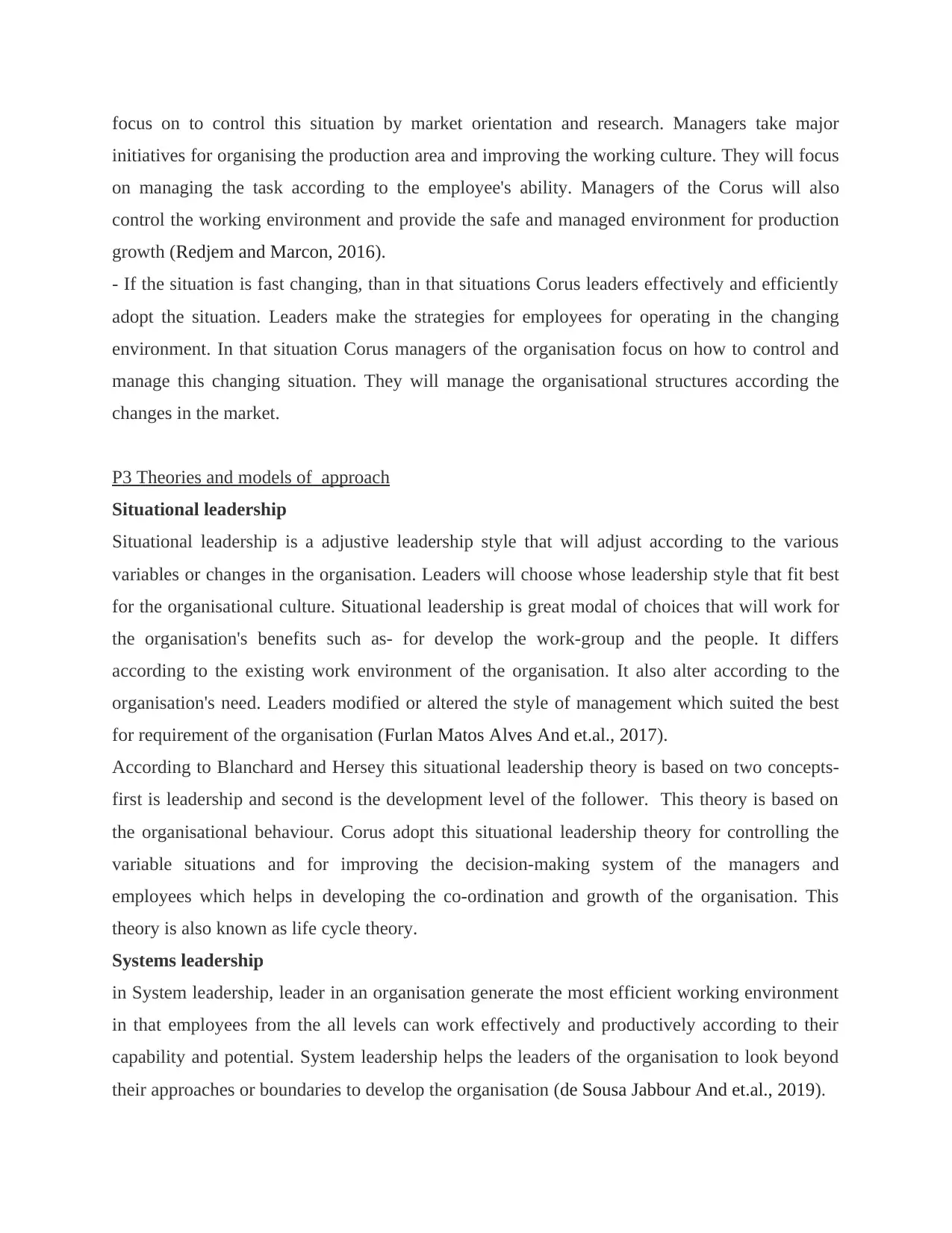
focus on to control this situation by market orientation and research. Managers take major
initiatives for organising the production area and improving the working culture. They will focus
on managing the task according to the employee's ability. Managers of the Corus will also
control the working environment and provide the safe and managed environment for production
growth (Redjem and Marcon, 2016).
- If the situation is fast changing, than in that situations Corus leaders effectively and efficiently
adopt the situation. Leaders make the strategies for employees for operating in the changing
environment. In that situation Corus managers of the organisation focus on how to control and
manage this changing situation. They will manage the organisational structures according the
changes in the market.
P3 Theories and models of approach
Situational leadership
Situational leadership is a adjustive leadership style that will adjust according to the various
variables or changes in the organisation. Leaders will choose whose leadership style that fit best
for the organisational culture. Situational leadership is great modal of choices that will work for
the organisation's benefits such as- for develop the work-group and the people. It differs
according to the existing work environment of the organisation. It also alter according to the
organisation's need. Leaders modified or altered the style of management which suited the best
for requirement of the organisation (Furlan Matos Alves And et.al., 2017).
According to Blanchard and Hersey this situational leadership theory is based on two concepts-
first is leadership and second is the development level of the follower. This theory is based on
the organisational behaviour. Corus adopt this situational leadership theory for controlling the
variable situations and for improving the decision-making system of the managers and
employees which helps in developing the co-ordination and growth of the organisation. This
theory is also known as life cycle theory.
Systems leadership
in System leadership, leader in an organisation generate the most efficient working environment
in that employees from the all levels can work effectively and productively according to their
capability and potential. System leadership helps the leaders of the organisation to look beyond
their approaches or boundaries to develop the organisation (de Sousa Jabbour And et.al., 2019).
initiatives for organising the production area and improving the working culture. They will focus
on managing the task according to the employee's ability. Managers of the Corus will also
control the working environment and provide the safe and managed environment for production
growth (Redjem and Marcon, 2016).
- If the situation is fast changing, than in that situations Corus leaders effectively and efficiently
adopt the situation. Leaders make the strategies for employees for operating in the changing
environment. In that situation Corus managers of the organisation focus on how to control and
manage this changing situation. They will manage the organisational structures according the
changes in the market.
P3 Theories and models of approach
Situational leadership
Situational leadership is a adjustive leadership style that will adjust according to the various
variables or changes in the organisation. Leaders will choose whose leadership style that fit best
for the organisational culture. Situational leadership is great modal of choices that will work for
the organisation's benefits such as- for develop the work-group and the people. It differs
according to the existing work environment of the organisation. It also alter according to the
organisation's need. Leaders modified or altered the style of management which suited the best
for requirement of the organisation (Furlan Matos Alves And et.al., 2017).
According to Blanchard and Hersey this situational leadership theory is based on two concepts-
first is leadership and second is the development level of the follower. This theory is based on
the organisational behaviour. Corus adopt this situational leadership theory for controlling the
variable situations and for improving the decision-making system of the managers and
employees which helps in developing the co-ordination and growth of the organisation. This
theory is also known as life cycle theory.
Systems leadership
in System leadership, leader in an organisation generate the most efficient working environment
in that employees from the all levels can work effectively and productively according to their
capability and potential. System leadership helps the leaders of the organisation to look beyond
their approaches or boundaries to develop the organisation (de Sousa Jabbour And et.al., 2019).
Paraphrase This Document
Need a fresh take? Get an instant paraphrase of this document with our AI Paraphraser
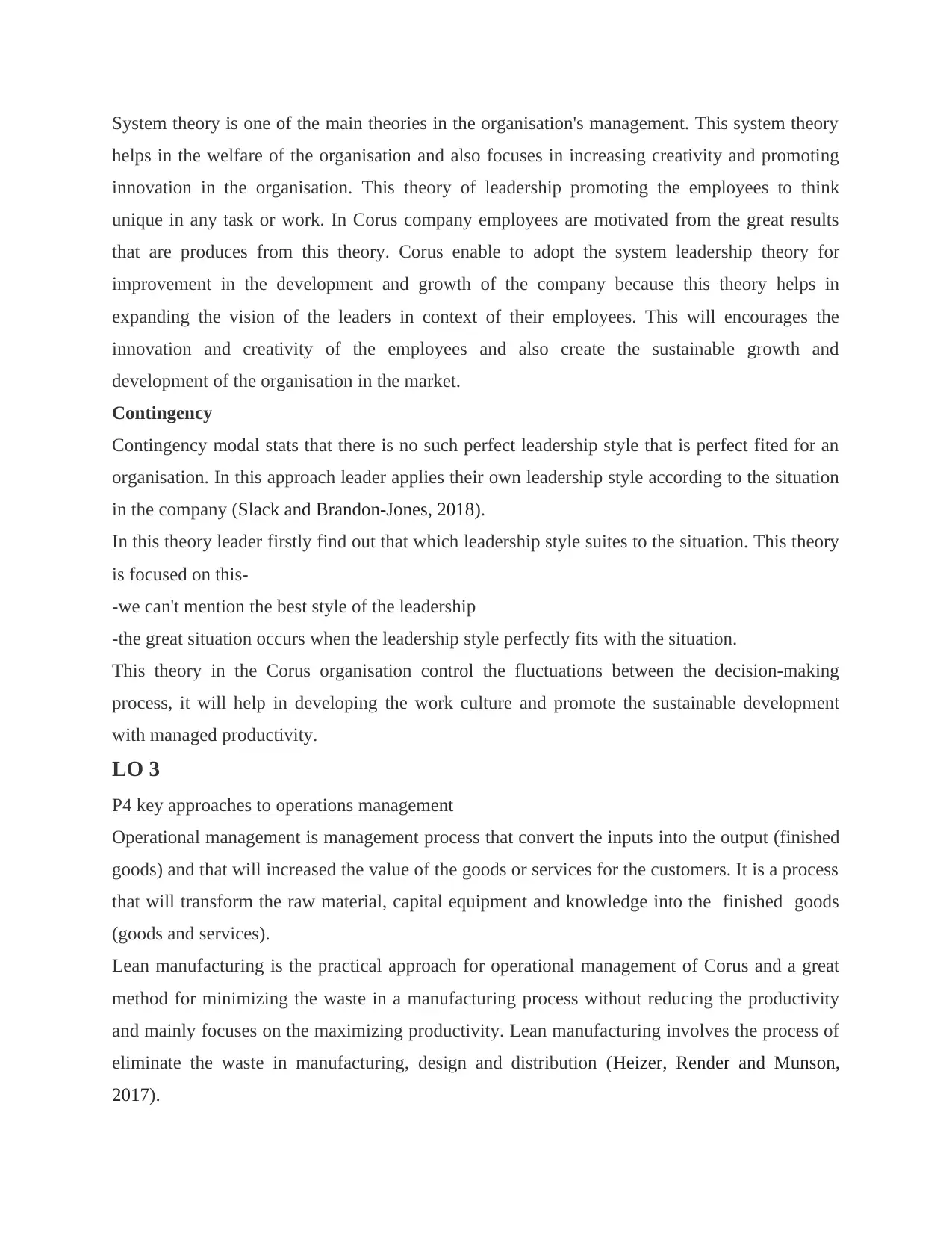
System theory is one of the main theories in the organisation's management. This system theory
helps in the welfare of the organisation and also focuses in increasing creativity and promoting
innovation in the organisation. This theory of leadership promoting the employees to think
unique in any task or work. In Corus company employees are motivated from the great results
that are produces from this theory. Corus enable to adopt the system leadership theory for
improvement in the development and growth of the company because this theory helps in
expanding the vision of the leaders in context of their employees. This will encourages the
innovation and creativity of the employees and also create the sustainable growth and
development of the organisation in the market.
Contingency
Contingency modal stats that there is no such perfect leadership style that is perfect fited for an
organisation. In this approach leader applies their own leadership style according to the situation
in the company (Slack and Brandon-Jones, 2018).
In this theory leader firstly find out that which leadership style suites to the situation. This theory
is focused on this-
-we can't mention the best style of the leadership
-the great situation occurs when the leadership style perfectly fits with the situation.
This theory in the Corus organisation control the fluctuations between the decision-making
process, it will help in developing the work culture and promote the sustainable development
with managed productivity.
LO 3
P4 key approaches to operations management
Operational management is management process that convert the inputs into the output (finished
goods) and that will increased the value of the goods or services for the customers. It is a process
that will transform the raw material, capital equipment and knowledge into the finished goods
(goods and services).
Lean manufacturing is the practical approach for operational management of Corus and a great
method for minimizing the waste in a manufacturing process without reducing the productivity
and mainly focuses on the maximizing productivity. Lean manufacturing involves the process of
eliminate the waste in manufacturing, design and distribution (Heizer, Render and Munson,
2017).
helps in the welfare of the organisation and also focuses in increasing creativity and promoting
innovation in the organisation. This theory of leadership promoting the employees to think
unique in any task or work. In Corus company employees are motivated from the great results
that are produces from this theory. Corus enable to adopt the system leadership theory for
improvement in the development and growth of the company because this theory helps in
expanding the vision of the leaders in context of their employees. This will encourages the
innovation and creativity of the employees and also create the sustainable growth and
development of the organisation in the market.
Contingency
Contingency modal stats that there is no such perfect leadership style that is perfect fited for an
organisation. In this approach leader applies their own leadership style according to the situation
in the company (Slack and Brandon-Jones, 2018).
In this theory leader firstly find out that which leadership style suites to the situation. This theory
is focused on this-
-we can't mention the best style of the leadership
-the great situation occurs when the leadership style perfectly fits with the situation.
This theory in the Corus organisation control the fluctuations between the decision-making
process, it will help in developing the work culture and promote the sustainable development
with managed productivity.
LO 3
P4 key approaches to operations management
Operational management is management process that convert the inputs into the output (finished
goods) and that will increased the value of the goods or services for the customers. It is a process
that will transform the raw material, capital equipment and knowledge into the finished goods
(goods and services).
Lean manufacturing is the practical approach for operational management of Corus and a great
method for minimizing the waste in a manufacturing process without reducing the productivity
and mainly focuses on the maximizing productivity. Lean manufacturing involves the process of
eliminate the waste in manufacturing, design and distribution (Heizer, Render and Munson,
2017).
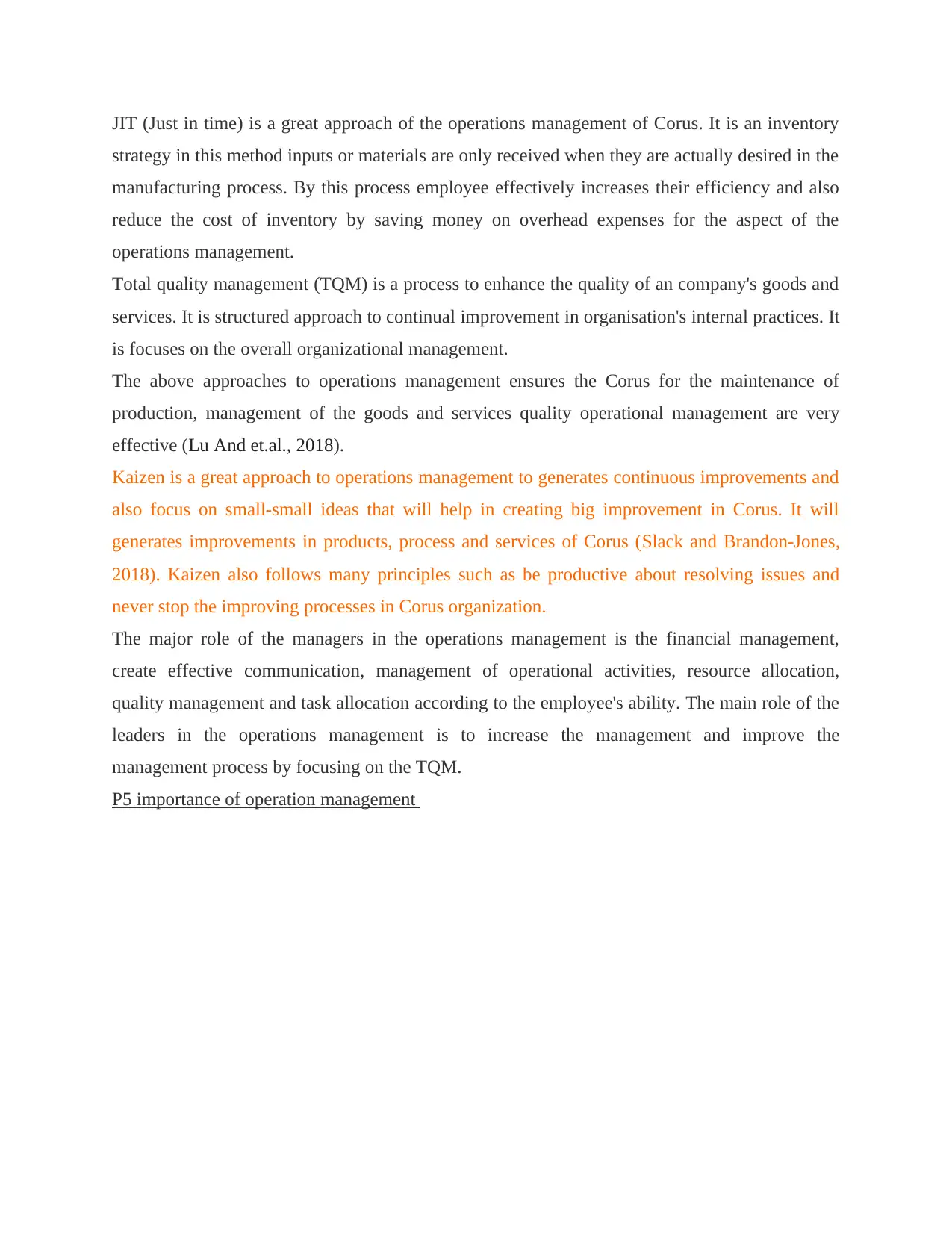
JIT (Just in time) is a great approach of the operations management of Corus. It is an inventory
strategy in this method inputs or materials are only received when they are actually desired in the
manufacturing process. By this process employee effectively increases their efficiency and also
reduce the cost of inventory by saving money on overhead expenses for the aspect of the
operations management.
Total quality management (TQM) is a process to enhance the quality of an company's goods and
services. It is structured approach to continual improvement in organisation's internal practices. It
is focuses on the overall organizational management.
The above approaches to operations management ensures the Corus for the maintenance of
production, management of the goods and services quality operational management are very
effective (Lu And et.al., 2018).
Kaizen is a great approach to operations management to generates continuous improvements and
also focus on small-small ideas that will help in creating big improvement in Corus. It will
generates improvements in products, process and services of Corus (Slack and Brandon-Jones,
2018). Kaizen also follows many principles such as be productive about resolving issues and
never stop the improving processes in Corus organization.
The major role of the managers in the operations management is the financial management,
create effective communication, management of operational activities, resource allocation,
quality management and task allocation according to the employee's ability. The main role of the
leaders in the operations management is to increase the management and improve the
management process by focusing on the TQM.
P5 importance of operation management
strategy in this method inputs or materials are only received when they are actually desired in the
manufacturing process. By this process employee effectively increases their efficiency and also
reduce the cost of inventory by saving money on overhead expenses for the aspect of the
operations management.
Total quality management (TQM) is a process to enhance the quality of an company's goods and
services. It is structured approach to continual improvement in organisation's internal practices. It
is focuses on the overall organizational management.
The above approaches to operations management ensures the Corus for the maintenance of
production, management of the goods and services quality operational management are very
effective (Lu And et.al., 2018).
Kaizen is a great approach to operations management to generates continuous improvements and
also focus on small-small ideas that will help in creating big improvement in Corus. It will
generates improvements in products, process and services of Corus (Slack and Brandon-Jones,
2018). Kaizen also follows many principles such as be productive about resolving issues and
never stop the improving processes in Corus organization.
The major role of the managers in the operations management is the financial management,
create effective communication, management of operational activities, resource allocation,
quality management and task allocation according to the employee's ability. The main role of the
leaders in the operations management is to increase the management and improve the
management process by focusing on the TQM.
P5 importance of operation management
⊘ This is a preview!⊘
Do you want full access?
Subscribe today to unlock all pages.

Trusted by 1+ million students worldwide
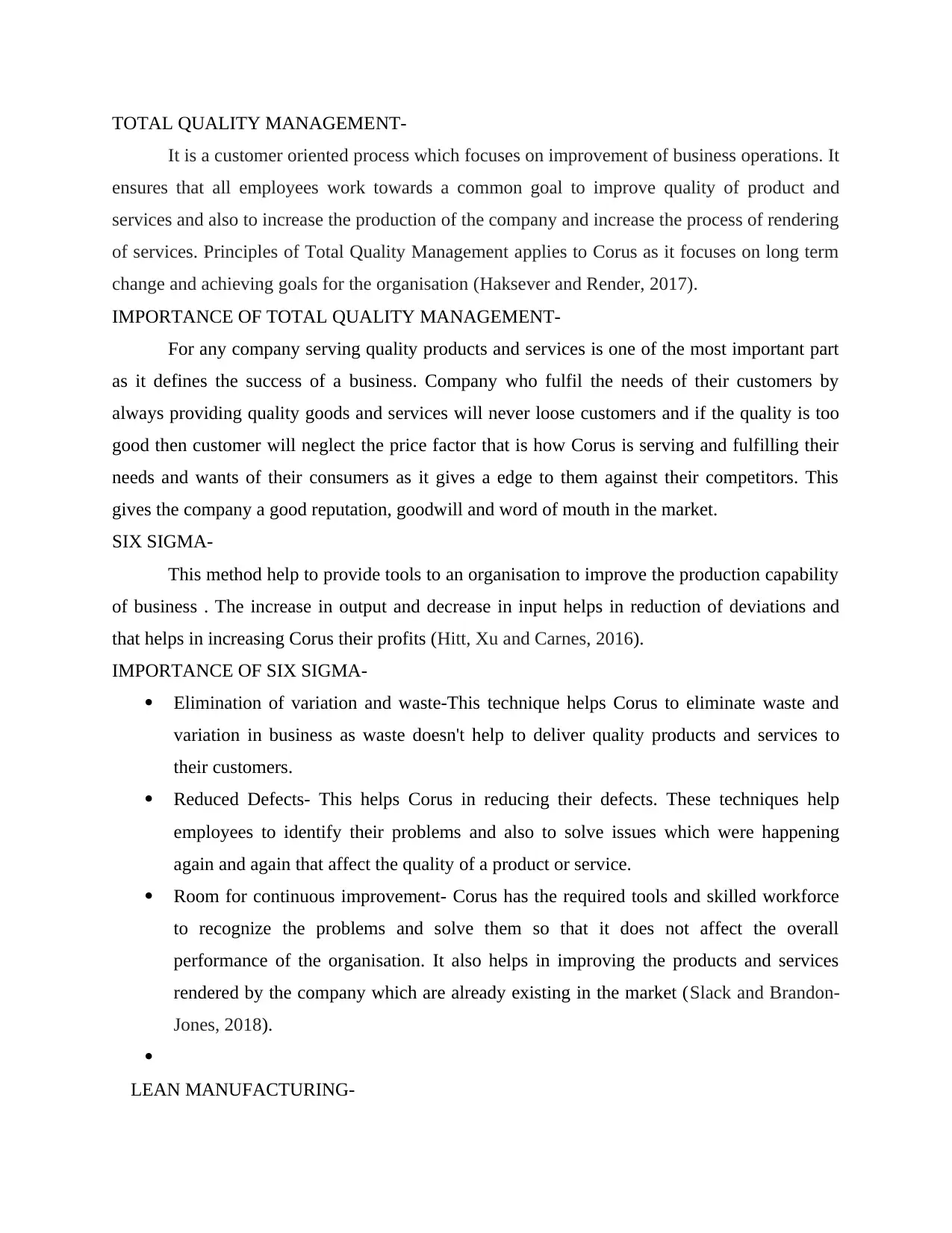
TOTAL QUALITY MANAGEMENT-
It is a customer oriented process which focuses on improvement of business operations. It
ensures that all employees work towards a common goal to improve quality of product and
services and also to increase the production of the company and increase the process of rendering
of services. Principles of Total Quality Management applies to Corus as it focuses on long term
change and achieving goals for the organisation (Haksever and Render, 2017).
IMPORTANCE OF TOTAL QUALITY MANAGEMENT-
For any company serving quality products and services is one of the most important part
as it defines the success of a business. Company who fulfil the needs of their customers by
always providing quality goods and services will never loose customers and if the quality is too
good then customer will neglect the price factor that is how Corus is serving and fulfilling their
needs and wants of their consumers as it gives a edge to them against their competitors. This
gives the company a good reputation, goodwill and word of mouth in the market.
SIX SIGMA-
This method help to provide tools to an organisation to improve the production capability
of business . The increase in output and decrease in input helps in reduction of deviations and
that helps in increasing Corus their profits (Hitt, Xu and Carnes, 2016).
IMPORTANCE OF SIX SIGMA-
Elimination of variation and waste-This technique helps Corus to eliminate waste and
variation in business as waste doesn't help to deliver quality products and services to
their customers.
Reduced Defects- This helps Corus in reducing their defects. These techniques help
employees to identify their problems and also to solve issues which were happening
again and again that affect the quality of a product or service.
Room for continuous improvement- Corus has the required tools and skilled workforce
to recognize the problems and solve them so that it does not affect the overall
performance of the organisation. It also helps in improving the products and services
rendered by the company which are already existing in the market (Slack and Brandon-
Jones, 2018).
LEAN MANUFACTURING-
It is a customer oriented process which focuses on improvement of business operations. It
ensures that all employees work towards a common goal to improve quality of product and
services and also to increase the production of the company and increase the process of rendering
of services. Principles of Total Quality Management applies to Corus as it focuses on long term
change and achieving goals for the organisation (Haksever and Render, 2017).
IMPORTANCE OF TOTAL QUALITY MANAGEMENT-
For any company serving quality products and services is one of the most important part
as it defines the success of a business. Company who fulfil the needs of their customers by
always providing quality goods and services will never loose customers and if the quality is too
good then customer will neglect the price factor that is how Corus is serving and fulfilling their
needs and wants of their consumers as it gives a edge to them against their competitors. This
gives the company a good reputation, goodwill and word of mouth in the market.
SIX SIGMA-
This method help to provide tools to an organisation to improve the production capability
of business . The increase in output and decrease in input helps in reduction of deviations and
that helps in increasing Corus their profits (Hitt, Xu and Carnes, 2016).
IMPORTANCE OF SIX SIGMA-
Elimination of variation and waste-This technique helps Corus to eliminate waste and
variation in business as waste doesn't help to deliver quality products and services to
their customers.
Reduced Defects- This helps Corus in reducing their defects. These techniques help
employees to identify their problems and also to solve issues which were happening
again and again that affect the quality of a product or service.
Room for continuous improvement- Corus has the required tools and skilled workforce
to recognize the problems and solve them so that it does not affect the overall
performance of the organisation. It also helps in improving the products and services
rendered by the company which are already existing in the market (Slack and Brandon-
Jones, 2018).
LEAN MANUFACTURING-
Paraphrase This Document
Need a fresh take? Get an instant paraphrase of this document with our AI Paraphraser
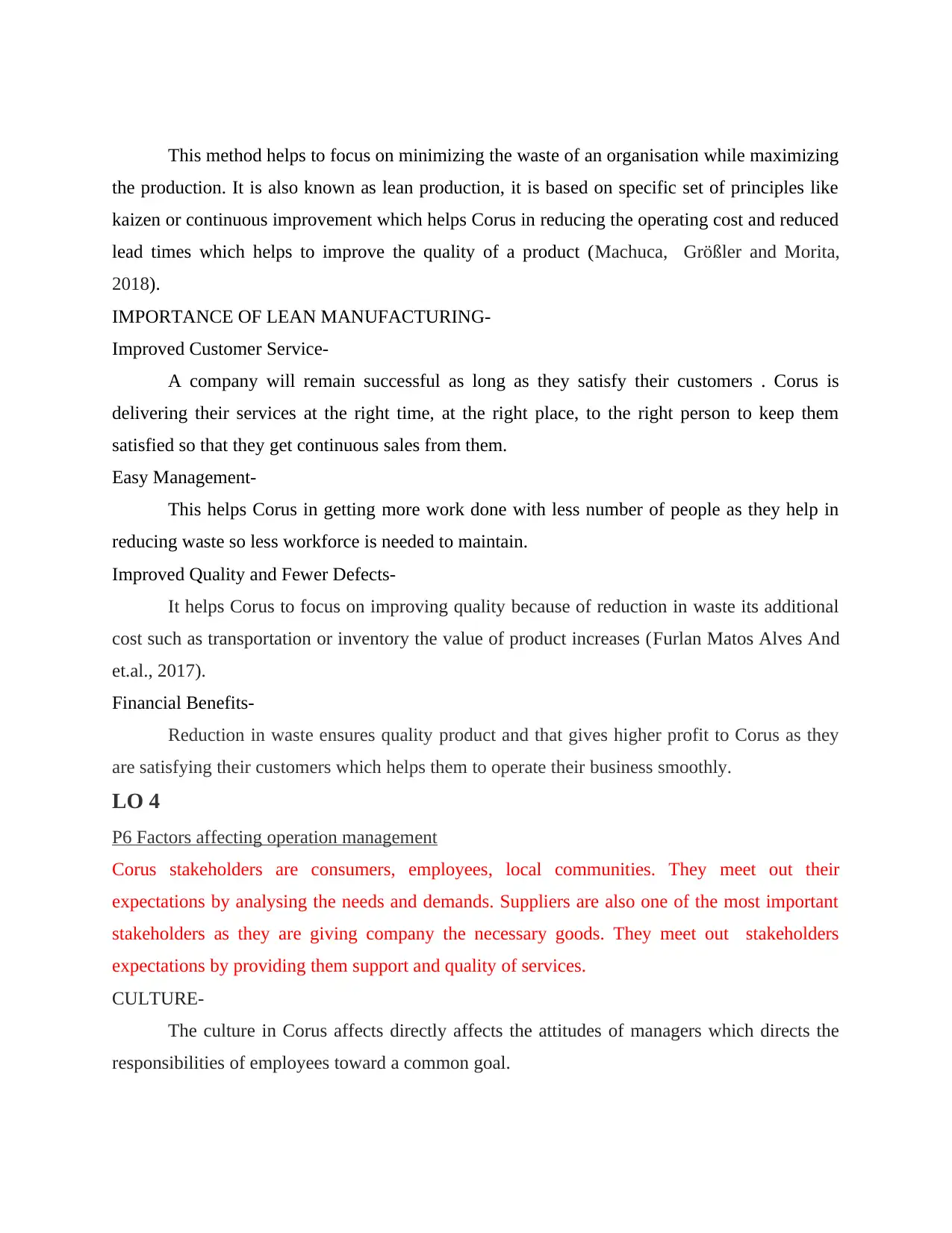
This method helps to focus on minimizing the waste of an organisation while maximizing
the production. It is also known as lean production, it is based on specific set of principles like
kaizen or continuous improvement which helps Corus in reducing the operating cost and reduced
lead times which helps to improve the quality of a product (Machuca, Größler and Morita,
2018).
IMPORTANCE OF LEAN MANUFACTURING-
Improved Customer Service-
A company will remain successful as long as they satisfy their customers . Corus is
delivering their services at the right time, at the right place, to the right person to keep them
satisfied so that they get continuous sales from them.
Easy Management-
This helps Corus in getting more work done with less number of people as they help in
reducing waste so less workforce is needed to maintain.
Improved Quality and Fewer Defects-
It helps Corus to focus on improving quality because of reduction in waste its additional
cost such as transportation or inventory the value of product increases (Furlan Matos Alves And
et.al., 2017).
Financial Benefits-
Reduction in waste ensures quality product and that gives higher profit to Corus as they
are satisfying their customers which helps them to operate their business smoothly.
LO 4
P6 Factors affecting operation management
Corus stakeholders are consumers, employees, local communities. They meet out their
expectations by analysing the needs and demands. Suppliers are also one of the most important
stakeholders as they are giving company the necessary goods. They meet out stakeholders
expectations by providing them support and quality of services.
CULTURE-
The culture in Corus affects directly affects the attitudes of managers which directs the
responsibilities of employees toward a common goal.
the production. It is also known as lean production, it is based on specific set of principles like
kaizen or continuous improvement which helps Corus in reducing the operating cost and reduced
lead times which helps to improve the quality of a product (Machuca, Größler and Morita,
2018).
IMPORTANCE OF LEAN MANUFACTURING-
Improved Customer Service-
A company will remain successful as long as they satisfy their customers . Corus is
delivering their services at the right time, at the right place, to the right person to keep them
satisfied so that they get continuous sales from them.
Easy Management-
This helps Corus in getting more work done with less number of people as they help in
reducing waste so less workforce is needed to maintain.
Improved Quality and Fewer Defects-
It helps Corus to focus on improving quality because of reduction in waste its additional
cost such as transportation or inventory the value of product increases (Furlan Matos Alves And
et.al., 2017).
Financial Benefits-
Reduction in waste ensures quality product and that gives higher profit to Corus as they
are satisfying their customers which helps them to operate their business smoothly.
LO 4
P6 Factors affecting operation management
Corus stakeholders are consumers, employees, local communities. They meet out their
expectations by analysing the needs and demands. Suppliers are also one of the most important
stakeholders as they are giving company the necessary goods. They meet out stakeholders
expectations by providing them support and quality of services.
CULTURE-
The culture in Corus affects directly affects the attitudes of managers which directs the
responsibilities of employees toward a common goal.
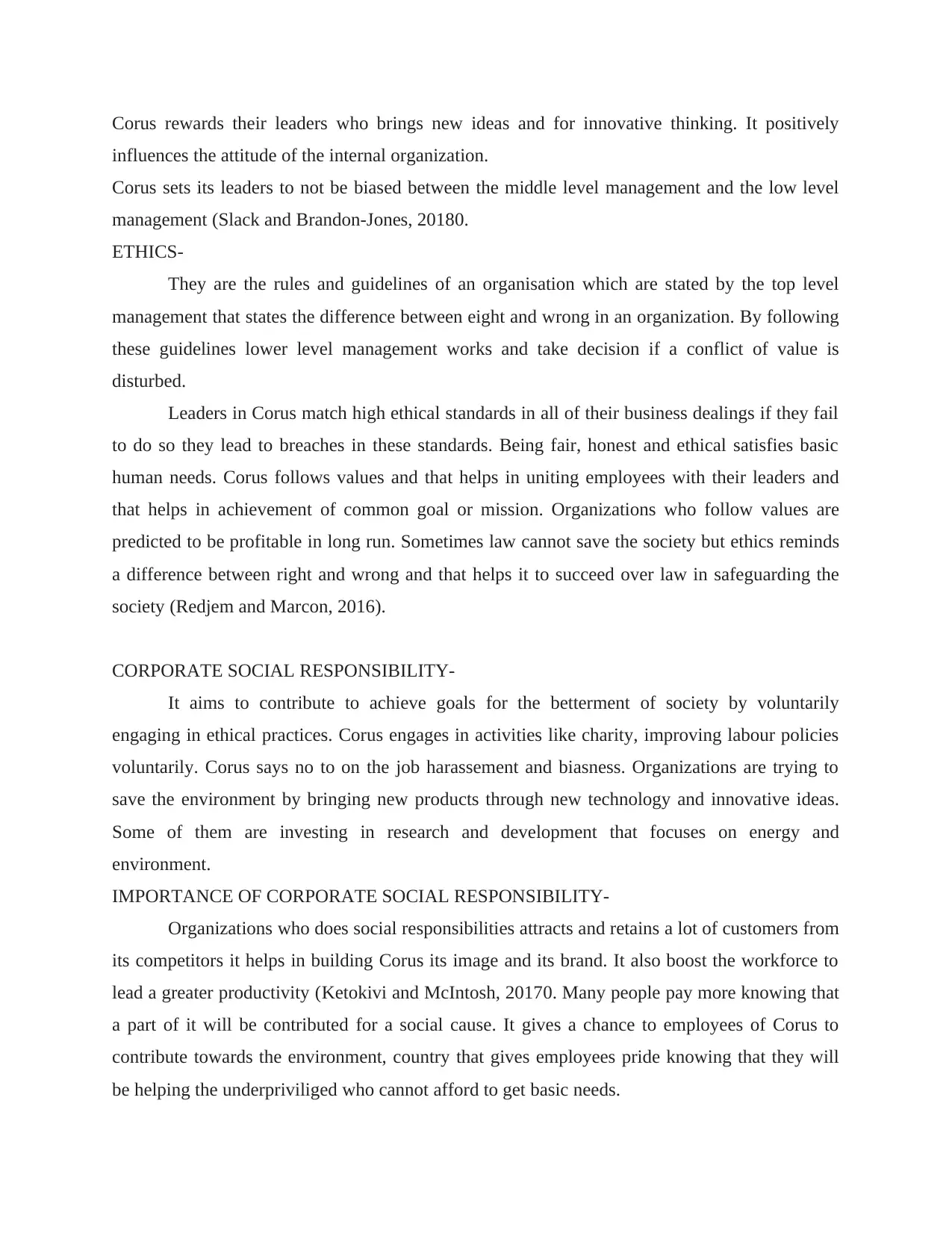
Corus rewards their leaders who brings new ideas and for innovative thinking. It positively
influences the attitude of the internal organization.
Corus sets its leaders to not be biased between the middle level management and the low level
management (Slack and Brandon-Jones, 20180.
ETHICS-
They are the rules and guidelines of an organisation which are stated by the top level
management that states the difference between eight and wrong in an organization. By following
these guidelines lower level management works and take decision if a conflict of value is
disturbed.
Leaders in Corus match high ethical standards in all of their business dealings if they fail
to do so they lead to breaches in these standards. Being fair, honest and ethical satisfies basic
human needs. Corus follows values and that helps in uniting employees with their leaders and
that helps in achievement of common goal or mission. Organizations who follow values are
predicted to be profitable in long run. Sometimes law cannot save the society but ethics reminds
a difference between right and wrong and that helps it to succeed over law in safeguarding the
society (Redjem and Marcon, 2016).
CORPORATE SOCIAL RESPONSIBILITY-
It aims to contribute to achieve goals for the betterment of society by voluntarily
engaging in ethical practices. Corus engages in activities like charity, improving labour policies
voluntarily. Corus says no to on the job harassement and biasness. Organizations are trying to
save the environment by bringing new products through new technology and innovative ideas.
Some of them are investing in research and development that focuses on energy and
environment.
IMPORTANCE OF CORPORATE SOCIAL RESPONSIBILITY-
Organizations who does social responsibilities attracts and retains a lot of customers from
its competitors it helps in building Corus its image and its brand. It also boost the workforce to
lead a greater productivity (Ketokivi and McIntosh, 20170. Many people pay more knowing that
a part of it will be contributed for a social cause. It gives a chance to employees of Corus to
contribute towards the environment, country that gives employees pride knowing that they will
be helping the underpriviliged who cannot afford to get basic needs.
influences the attitude of the internal organization.
Corus sets its leaders to not be biased between the middle level management and the low level
management (Slack and Brandon-Jones, 20180.
ETHICS-
They are the rules and guidelines of an organisation which are stated by the top level
management that states the difference between eight and wrong in an organization. By following
these guidelines lower level management works and take decision if a conflict of value is
disturbed.
Leaders in Corus match high ethical standards in all of their business dealings if they fail
to do so they lead to breaches in these standards. Being fair, honest and ethical satisfies basic
human needs. Corus follows values and that helps in uniting employees with their leaders and
that helps in achievement of common goal or mission. Organizations who follow values are
predicted to be profitable in long run. Sometimes law cannot save the society but ethics reminds
a difference between right and wrong and that helps it to succeed over law in safeguarding the
society (Redjem and Marcon, 2016).
CORPORATE SOCIAL RESPONSIBILITY-
It aims to contribute to achieve goals for the betterment of society by voluntarily
engaging in ethical practices. Corus engages in activities like charity, improving labour policies
voluntarily. Corus says no to on the job harassement and biasness. Organizations are trying to
save the environment by bringing new products through new technology and innovative ideas.
Some of them are investing in research and development that focuses on energy and
environment.
IMPORTANCE OF CORPORATE SOCIAL RESPONSIBILITY-
Organizations who does social responsibilities attracts and retains a lot of customers from
its competitors it helps in building Corus its image and its brand. It also boost the workforce to
lead a greater productivity (Ketokivi and McIntosh, 20170. Many people pay more knowing that
a part of it will be contributed for a social cause. It gives a chance to employees of Corus to
contribute towards the environment, country that gives employees pride knowing that they will
be helping the underpriviliged who cannot afford to get basic needs.
⊘ This is a preview!⊘
Do you want full access?
Subscribe today to unlock all pages.

Trusted by 1+ million students worldwide
1 out of 14
Related Documents
Your All-in-One AI-Powered Toolkit for Academic Success.
+13062052269
info@desklib.com
Available 24*7 on WhatsApp / Email
![[object Object]](/_next/static/media/star-bottom.7253800d.svg)
Unlock your academic potential
Copyright © 2020–2026 A2Z Services. All Rights Reserved. Developed and managed by ZUCOL.





